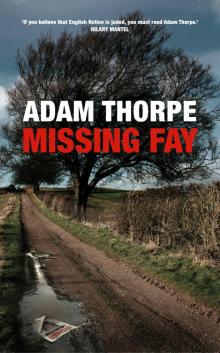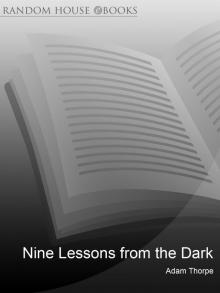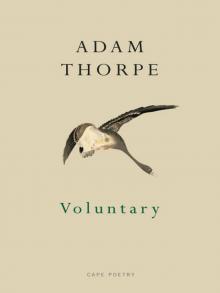- Home
- Adam Thorpe
The Standing Pool Page 18
The Standing Pool Read online
Page 18
This book was interesting, with a lot in it about Camp IV. It cost twenty francs and had a coffee-ring on the cover. He studied the photographs, linking the handsome, living portraits and the dead, battered faces. His father wasn’t mentioned anywhere, but then he was only a boy who brought bread and messages, sworn to silence. Sometimes Jean-Luc wondered, in the periods when his father was behaving really badly and his son hated him, whether the boy messenger wasn’t the one who tipped off the Germans. Only a local knew the way to Jallau, along the sheep-paths. But his father would cry real tears, sometimes, when remembering those men of Camp IV: and Jean-Luc never dared ask him where he was when the camp was surprised by the SS.
There were the twelve corpses, lined up neatly on the grass, some in bare feet, all in baggy trousers, blood coming out of their mouths and noses. One or two looked as if they were sunbathing, with little smiles. A German in uniform was crouched at the far end, his hand on a foot. Jean-Luc wondered what he was thinking. A separate photograph of the dead maquis camp commander showed something strange about his arm; it was bulging in the wrong places, connected to the body in a strange way, and the hand looked like a pig’s bladder. And his face! In the unclear photograph, it was calm under the webs of blood, but the left eye had been blotted out and the nose was swollen and someone had wrapped a cloth around the neck, hiding the chin. Jean-Luc knew the commander, whose Resistance name was ‘Villon’, had been badly tortured before execution. But there was no sign of pain in his expression.
This fascinated Jean-Luc, and he would (up until only a few years back) lie on the floor of his room in the same way, his arm bent crookedly, and adopt the corpse’s peaceful expression, trying to understand what death was. On bad days, he would also enact what came before the death, rolling about on the floor in dreadful agony, his testicles a bloodied mess, one eye gouged out, big SS boots stamping on his arm and then stamping again on the broken splinters. And oh, how sweet death felt, then! And how he understood that saintly expression!
And his mother would sometimes shout up the stairs, wondering what the noise was about. Or the silence after it. If only one could live alone, with only the birds and animals for company. If only the whole human race could be wiped out, starting with his own mother; then Marcel Lagrange; then the politicians; then the rich, especially the foreigners with swimming pools. Then anyone who happened to be in his way.
But he always shakes his head after these terrible thoughts, and laughs out loud. Doesn’t everyone have them? He doesn’t dare ask.
His father knew these young men of Camp IV. They were like fathers or brothers to him – Elie’s own father was a prisoner in Germany. The day after the massacre at Jallau, the bodies were shared out between the villages, to be put on display in the village mairies: Aubain had three of them, laid out on the council table, as stiff and cold as waxworks, their guts spilling from their shredded stomachs. The children at school had to file past, followed by the rest of the village. Jean-Luc’s father was among them, determined not to show how upset he was. The pig-necked SS soldiers were watching all the time. Watching their reactions. Six of the kids, from the Vasseur’s farm, were Jewish – they’d been swapped for six Vasseurs of the same age, farmed out to cousins since ’42. No one knew, or maybe they knew and didn’t say; there were so many Vasseurs, they bred like rabbits. Grégoire and Juliette Vasseur didn’t even get a medal, after the war, let alone a thank you.
You didn’t have to be a Jew, though, to be worried: this detachment had already shot dead ordinary folk for no good reason in the latest sweep – the Coutaud family in their isolated farm, five out of the full eight; Monsieur Bataille in his chateau up at Ardouillet, before chucking incendiary grenades into the lower rooms. They were angry, then, and now they were glad. But they were just as nasty.
It must have been that day, back in 1944, that his father got stuck.
Walking past the bodies in the mairie.
Or maybe during the beautiful early-morning moment of that time he had a double kill. Jean-Luc knew it off by heart; sometimes he felt it had been his own experience, that he was seeing it through his own eyes. His father’s gun is down in the cellar; he should clean and oil it, he thinks. It’s only right.
The hunt is running in the valley below, hidden. Then the music of the dogs (that’s how his father would put it) grows louder. The hunt is turning out of the valley and approaching where Elie lies behind the gorse bush and then there’s a panting and snorting and it’s two big beasts followed by three little ones crossing the field in a line right in front of him.
He lifts his gun and aims at the leader’s flank just in front of the groin and he fires and the boar squeals and stumbles and recovers enough to reach the trees and then it’s the second running into the notch of his sights and he pulls the trigger and nothing, it carries on running. The first of the little ones comes into view and he fires again and it rolls over instantly, as if by magic; so wild with excitement is Elie that the rest of the pack – the piglet’s brothers and sisters – vanish into the trees without another shot being fired.
All he has to do (and by now young Jean-Luc would all but mouth the words his father used, so familiar were they) – all he has to do is find the wounded animal and keep the dogs from ripping it apart. The other one is dead as a log, kidneys smashed. It’s a very young female. They aren’t supposed to kill them too young, but he didn’t have time to think. The wounded boar is the male of the group: he finds it by the barking and the squeals: surrounded by the dogs, still strong enough to keep them off with its huge tusks.
One shot in the head finishes it. Seventy-two kilos ready to be tied up and carried three kilometres along the rough track on his back.
‘It was a family,’ Jean–Luc would pipe up, the first few times his father told the story. ‘Like us. Papa, Maman, and three little ones.’ (In fact, he was an only child, but Papa knew what he meant.)
‘I just thought of them as Germans,’ said his father, each time. Then he would grunt, a bit like a boar himself. ‘Listen, Janno. We were hardened, back then. Nothing but chestnuts, chestnuts, chestnuts. Rough winters, almost no fuel: that had hardened us, not weakened us. We slept outside. We were on the alert. We were as hard as animals. It was war.’
At those moments, when his father talked like a real maquisard, the young Jean-Luc would feel weak and girlish. He almost wished there had been a war when he was growing up, that he might have become his father’s equal. But he would have been filled with hatred, too, and that Jean-Luc was glad not to have inside him. That anger, that hatred. The thirst for revenge that could never be satisfied. Everyone having to forgive and forget, once a bit of cleansing had happened. Jean-Luc’s father among them.
‘Nothing can bring back our Fernand,’ he would say. ‘I’m not going to end up like Mamie. I’m not going to go mad.’
When Jean-Luc’s paternal grandfather, Gabriel, returned from Germany, it was two years after the end of the war. He hadn’t been missed, being a lazy, bad-tempered type. He walked into the village on foot, as he’d walked all the way from the East on foot, with the odd lift in a cart (or so he claimed – but he was also something of a liar, it was said). The first person he passed was someone working in a field. That person was Elie, his own son. He didn’t recognise his own son, after seven years away. And Elie didn’t recognise his own father, so thin had he grown, and so long was it since he had gone away. So each waved to the other, politely, but neither knew.
That’s hard to imagine, Jean-Luc would think as a child, when his father had recounted this other story yet again. And Jean-Luc would pretend he was in the field, hoeing or planting, where a bright yellow villa has been built since. And he would look up and see Gabriel – who had become his father in his imagination, not his grandfather – lift his arm, waving, and he would not know him from Adam. All he could see was a thin man with browned, leathery skin and a drinker’s pouches under his eyes.
A stranger. A stranger means trouble, most times
. Gabriel found his wife, Clémentine – Jean-Luc’s grandmother – had hitched up with Léon, the blacksmith from Valdaron. They had all thought Gabriel was dead.
Fortunately, Gabriel left within a fortnight. Vanished, no doubt taking to the road in a huff and disappearing into drink. But wicked rumours, started by the Lagrange clan, suggested he’d vanished more permanently: that the blacksmith and Jean-Luc’s grandmother were behind it. Then the rumours swirled into all the other murmurings that followed the war and, by the time Jean-Luc was born, had become fossilised – and might as well have been millions of years old, for all the truth they told.
Even the Lagrange clan let go of the Gabriel business; they had too much murk on their own side. A lid was put on it all. The blacksmith Léon was killed by a horse’s hoof in the head in 1953. Maybe that’s when Clémentine went mad. Electricity came to the village, then piped water, then, in 1993, a proper drainage system that ended up in a huge circular septic tank that converted the shit to a clear stream. Aubain no longer smelt. It was a new era. Foreigners began to buy houses, the older and more decrepit the better. Swimming pools appeared, bright blue, flashing in the sun, more and more of them, a whole emergency fleet of them – until even the locals had caught the disease.
Towards the end of his life, though, Jean-Luc’s father would talk about nothing else but the war: always the same stories, in the same order, as if he were burrowing back, finding the reason why it all happened. Over and over again, like a tape recorder with only one tape. Until he resorted to Oc, which Jean-Luc only half understood. Over and over again the stories were told, in a gabble of Occitan. No wonder Jean-Luc’s mother had her husband put away in a home, where he could drive the nurses mad instead of herself.
‘But that’s their job,’ she would say. ‘That’s what we pay for in our taxes.’
Not that she paid any tax; they earned too little. And anyway his father withered away after a few months in the home at St-Maurice. Jean-Luc couldn’t stand its smell. It was the smell of sickness and death: toilets, medicines, bleach and rottenness. No wonder Elie Maille fell silent in the last week or so, gazing into the distance as if through the wall of his little room. Jean-Luc was sure his father was back on that slope in the hills, crouched behind the gorse, hearing the lovely dogs bark and the whole hunt moving towards where he had been waiting with his gun since before dawn.
Maybe he’s up there now, Jean-Luc would think. Maybe if I went up there on the anniversary of the hunt, before dawn, I’d see him crouched behind the gorse bush, just the same but aged seventeen and with eyes covered over in a film of white like the skin on old milk.
Like Nick, Sarah was ‘worried’ about Mrs Foster. After the school’s nativity play (in which Tammy played a singing ladder up to heaven), Nick said that Mrs Foster was the type for whom Creationism was validated every morning by the mirror.
He was annoyed because he hadn’t been able to take photographs, even after the play: there were other kids around and the Mallinsons might put the snaps on their computer and send them to paedophiles or cut-and-paste the heads onto naked children’s bodies and so on. Nick fulminated at the fallen world and had a bit of an argument with Mrs Foster, who said it was nothing to do with her, it was health and safety. No photos whatsoever, Mr Mallinson. Sorry.
Mrs Foster was the acting head, now: the rather dull and crabby Miss Kearton had been killed in her car by a newly arrived Pole speeding the wrong side of the Cambridge ring road; he had claimed afterwards that, having realised his continental mistake, he’d been heading as fast as possible for the exit.
Miss Kearton’s death engendered, with Mrs Foster’s encouragement, a Diana-like flood of flowers in front of the school gates. Nick thought about this as they walked along the road to the cemetery. The whole thing had annoyed him, particularly as Tammy was very concerned about the size and expense of her own floral contribution in comparison with the others. He ended up spending far too much: Tammy virtually disappeared behind her showy mass of blooms as they approached the school gates and their huge blown-up photo, somewhat Stalin-like (he claimed), of a much younger Miss Kearton.
Which, of course, was defaced by obscenities within twenty-four hours, causing a mild spasm of despair in the community that surfaced in the local paper as quasi-fascistic rage. Photos were sent of the offending article, but it was decided that Miss Kearton would never have wanted herself to appear in public with blacked-out teeth, hairy nostrils, and obscene drawings all over her face. Tammy found it funny, but didn’t say so. And afterwards, when there were the jokes – about Miss Kearton driving into a pole and bending it, or whatever – she always giggled.
After passing a villa rendered (in the girls’ estimation) the yellow of sick, and then a stranded-looking, half-built one in breeze blocks next to a finished swimming pool, they came to the sign they’d noted on the way in, further from the village than expected. The cemetery was up a winding lane. The girls delayed their progress by treating the short hill as a Himalayan flank, plodding two or three exhausted steps then groaning, or sitting on the grassy verge like refugees. Contrary to their earlier enthusiasm – or at least Alicia’s – they saw no point in visiting the ‘stupid cemetery’; their father fell back on the limpest of justifications (‘It’s living history, guys’) while their mother gave ineffectual encouragement, counterbalancing Beans’s gravitational pull on the end of an outstretched arm. They gradually diluted into a straggly line; at one point the rest of his family were out of sight around the corner and Nick was alone.
He looked up at the sky, which was entirely without cloud or blemish. He might have been a fish at the bottom of the sea, with the bright, lit surface somewhere above him through layer after layer of blue. But the bottom of the sea is lightless, he reminded himself. This was more like the time he’d stood on the bottom of an outdoor public swimming pool as a boy, looking up, until his lungs were almost bursting and he’d had to kick up in a stream of bubbles. Here he was in the air and on the earth and sunlit, the warm photons settling on his face and making him happy. It is quite easy to be happy, he thought. It is a matter of simplification. Of cutting out what interferes in the appreciation of this. That glossed leaf, courageously itself against the depth of blue; a faint honey-smell of warming vegetation. He was actually alive. It’s not often you realise you are actually alive.
The others rounded the corner of the lane one by one, preceded by noise. Nick raised his arm ceremoniously.
‘Nearly there,’ he called. Beans was on her mother’s shoulders, bringing up the rear.
‘Dad-dy,’ Alicia whined, ‘you’re really horrible.’
‘I’ll give you a lift,’ he offered, although Alicia was getting heavy these days – a compact five-year-old.
‘What about me?’
‘You’ve got huge long legs, Tammy,’ said Sarah. ‘Is it much further, Nick?’
‘I said, we’re nearly there.’ Alicia settled on his back, crushing his upper vertebrae. Her hands were in his sparse hair, gripping his scalp like tiny suckers. Her pink shoes were not unsmelly, his fingers circling her ankles at chest-level. The hill felt steeper. He was too old for kids, at fifty-four. They exhausted him. They were unrelenting. He could have been their grandfather.
‘Vroom, vroom,’ he said, feebly, hoping he wouldn’t suddenly drop dead like the Vice Principal last year. ‘Formula One.’
And there were the gates.
The cemetery was surprisingly large for a small village, and had nice views from the crest of the hill it occupied. Four tall cypresses, black against the sunlight, lent a certain disconsolate harmony to the muddle of graves and crosses. The sun felt warmer up here, and beat off the stones in a blinding glare; it was hard to imagine it was still officially winter. The girls ran about between the tombs, gaily looking for Fernand Maille.
‘Fernand! Fernand!’ they called out, as if he were hiding.
Sarah hoped no one local would come, tolerant as the French were.
He was discov
ered by Tammy; carved on a simple grave he shared with other members of his family. The slab was scattered with miniature stelae and fake flowers, but no more clues were given as to the precise nature of his death. Sarah wondered if Jean-Luc could tell them more.
‘Hello, Mr Fernie-Wernie,’ Alicia joked, stroking the stone. ‘Bang! Bang!’
‘Let’s go and explore more,’ said Sarah, looking around her nervously. The three ran about again, making vrooming noises like boys.
A friend had told her that modern Western children, usually shielded from immediate experience of death, needed to visit cemeteries. Needed to have the truth gently introduced into their carefree, indulged lives. The way the girls were now, the picture of merriment between the slabs, seemed to rubbish the friend’s theory. Or perhaps not. Perhaps this was how life and death should be brought together.
Death was rock-hard. Her children were tiny scraps of softness. One of them might already be harbouring a mortal decay, a cancer. She was frightening herself.
She saw Tammy had braked in front of a huge, thick, slate-grey slab with a wavy top, and joined her. It belonged to the Lagrange family, with a cheery colour photo of the most recently deceased, a handsome man called Raoul. Died six years ago, almost to the day.
‘We saw the name Lagrange on the war memorial, didn’t we? He looks nice, poor man.’
She asked them to calculate his age, swinging her glasses from the crook of her forefinger.
‘A hundred and one,’ said Alicia.
‘Forty-four and three months and about ten days,’ Tammy murmured, with a sigh. ‘I don’t know how many hours and minutes.’

 Missing Fay
Missing Fay Hodd
Hodd Pieces of Light
Pieces of Light The Standing Pool
The Standing Pool Ulverton
Ulverton Nine Lessons From the Dark
Nine Lessons From the Dark Flight
Flight The Rules of Perspective
The Rules of Perspective From the Neanderthal
From the Neanderthal Is This the Way You Said?
Is This the Way You Said? Still
Still No Telling
No Telling Voluntary
Voluntary Between Each Breath
Between Each Breath